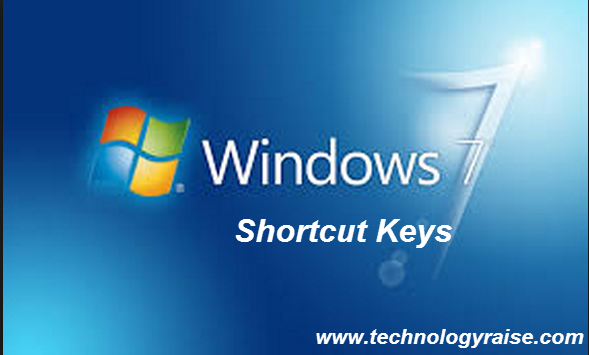
Keyboard shortcuts are mixtures of two or more keys that, when pressed, could be utilized to perform an action that would ordinarily need a mouse or other indicating apparatus. Keyboard shortcuts can make it less difficult to communicate with your computer, recovering your time.
Below you can see all the general and most useful short keys of windows 7.
Press this key
|
To do this
| |
F1
|
Display Help
| |
Ctrl + C (or Ctrl + Insert)
|
Copy the selected item
| |
Ctrl + X
|
Cut the selected item
| |
Ctrl + V (or Shift + Insert)
|
Paste the selected item
| |
Ctrl + Z
|
Undo an action
| |
Ctrl + Y
|
Redo an action
| |
Delete (or Ctrl + D)
|
Delete the selected item and move it to the Recycle Bin
| |
Shift + Delete
|
Delete the selected item without moving it to the Recycle Bin first
| |
F2
|
Rename the selected item
| |
Ctrl + Right Arrow
|
Move the cursor to the beginning of the next word
| |
Ctrl + Left Arrow
|
Move the cursor to the beginning of the previous word
| |
Ctrl + Down Arrow
|
Move the cursor to the beginning of the next paragraph
| |
Ctrl + Up Arrow
|
Move the cursor to the beginning of the previous paragraph
| |
Ctrl + Shift with an arrow key
|
Select a block of text
| |
Shift with any arrow key
|
Select more than one item in a window or on the desktop, or select text within a document
| |
Ctrl with any arrow key + Spacebar
|
Select multiple individual items in a window or on the desktop
| |
Ctrl + A
|
Select all items in a document or window
| |
F3
|
Search for a file or folder
| |
Alt + Enter
|
Display properties for the selected item
| |
Alt+F4
|
Close the active item, or exit the active program
| |
Alt + Spacebar
|
Open the shortcut menu for the active window
| |
Ctrl+F4
|
Close the active document (in programs that allow you to have multiple documents open simultaneously)
| |
Alt + Tab
|
Switch between open items
| |
Ctrl + Alt + Tab
|
Use the arrow keys to switch between open items
| |
Ctrl + Mouse scroll wheel
|
Change the size of icons on the desktop
| |
Windows logo key
|
Cycle through programs on the taskbar by using Aero Flip 3-D
| |
Ctrl + Windows logo key
|
Use the arrow keys to cycle through programs on the taskbar by using Aero Flip 3-D
| |
Alt + Esc
|
Cycle through items in the order in which they were opened
| |
F6
|
Cycle through screen elements in a window or on the desktop
| |
F4
|
Display the address bar list in Windows Explorer
| |
Shift + F10
|
Display the shortcut menu for the selected item
| |
Ctrl + Esc
|
Open the Start menu
| |
Alt + underlined letter
|
Display the corresponding menu
| |
Alt + underlined letter
|
Perform the menu command (or other underlined command)
| |
F10
|
Activate the menu bar in the active program
| |
Right Arrow
|
Open the next menu to the right, or open a submenu
| |
Left Arrow
|
Open the next menu to the left, or close a submenu
| |
F5 (or Ctrl + R)
|
Refresh the active window
| |
Alt + Up Arrow
|
View the folder one level up in Windows Explorer
| |
Esc
|
Cancel the current task
| |
Ctrl + Shift + Esc
|
Open Task Manager
| |
Shift when you insert a CD
|
Prevent the CD from automatically playing
| |
Left Alt + Shift
|
Switch the input language when multiple input languages are enabled
| |
Ctrl + Shift
|
Switch the keyboard layout when multiple keyboard layouts are enabled
| |
Right or Left Ctrl + Shift
|
Change the reading direction of text in right-to-leftreading languages
|












0 comments:
Post a Comment